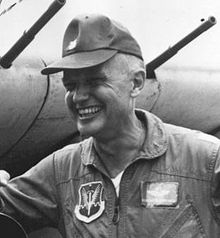Eugene Peyton Deatrick
| Eugene Peyton Deatrick, Jr. | |
|---|---|

Gene Deatrick by A-1E Skyraider in 1966
|
|
| Nickname(s) | Gene |
| Born |
November 17, 1924 Pittsburgh, Pennsylvania, U.S. |
| Allegiance |
|
| Service/branch |
|
| Years of service | 1943–1974 |
| Rank |
|
| Commands held |
|
| Battles/wars | Vietnam War |
| Awards |
|
| Other work | Aerospace Representative |
Eugene Peyton Deatrick, Jr. (born November 17, 1924) is a retired United States Air Force colonel, test pilot, and combat veteran. He is best recognized for his role in the rescue of United States Navy Lieutenant Dieter Dengler during the Vietnam War. The rescue was recounted in the Werner Herzog films Little Dieter Needs to Fly and Rescue Dawn and the national bestseller Hero Found: The Greatest POW Escape of the Vietnam War by author Bruce Henderson.
Eugene P. Deatrick, Jr. was born November 17, 1924, in Pittsburgh, Pennsylvania, the only child of Dr. Lily Bell Sefton Deatrick and Dr. Eugene P. Deatrick, Sr. He grew up in Morgantown, West Virginia where his mother was a professor of Chemistry and his father a professor of Agriculture at West Virginia University. Deatrick graduated from Woodrow Wilson High School in Washington, D.C. in 1942. During his first year of college at West Virginia University, Deatrick enlisted in the Air Corps Reserve. He was nominated to the United States Military Academy by Senator Jennings Randolph in 1943.
Deatrick arrived at West Point on July 1, 1943 and began six weeks of military training known as Beast Barracks due to the verbal abuse and hazing delivered by upper classmen to toughen the cadets. Cadets were grouped according to height, and the six-foot tall Deatrick was assigned to Company C, 1st Regiment known as "C1". Deatrick's interest in aviation was piqued during his freshman or "plebe" year when an AT-6 aircraft simulated a strafing attack on his group that was on field maneuvers sending them into the bushes to escape. As he watched the pilot wave, Deatrick decided he would apply for flight training when the opportunity arrived. A wartime change allowed cadets in their second year (known as "yearlings") to apply to become air cadets who upon graduation would receive both a commission and wings. Deatrick was accepted into the program and received basic flight training in 1945. On June 1, 1946, the air cadets received their wings from the commanding general of the Army Air Forces, Carl Spaatz. Deatrick graduated from USMA on June 4, 1946 with a merit ranking of 252 out of the 875 members of his class.
...
Wikipedia
